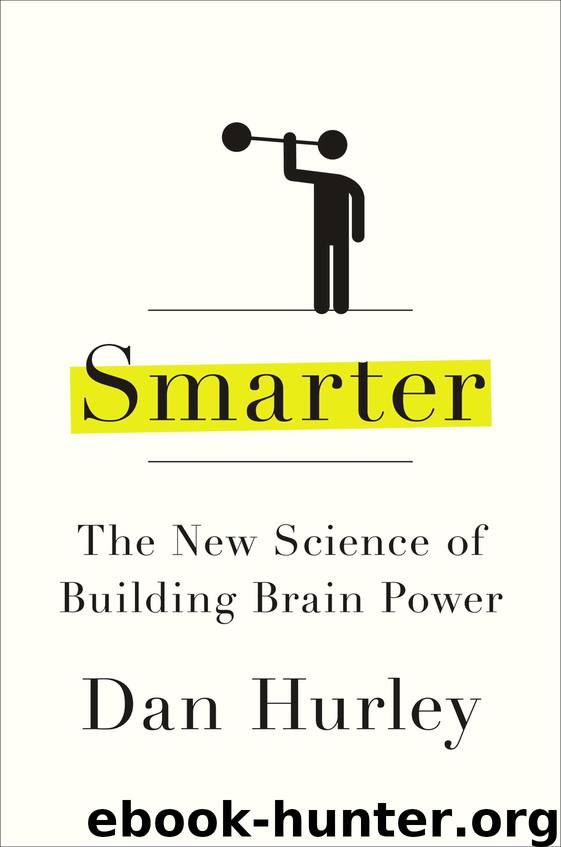Smarter by Dan Hurley

Author:Dan Hurley
Language: eng
Format: epub, mobi
Publisher: Penguin Group US
Published: 2013-12-25T16:00:00+00:00
In case you were wondering what all this running and tumbling has to do with intelligence, it just so happens that performance on the animal fluency test and on similar tests of quick list making is closely related to working memory and fluid intelligence. A 2013 study in the journal Memory and Cognition found that individuals with higher levels of working memory not only list more animals but generate more categories and draw more animals from each category than do those with a lower level of working memory. Fascinatingly, when the researchers prompted participants with a list of possible categories (which they were free to use or ignore), the gap between those with higher or lower working memory shrank significantly. And when the researchers went further, insisting that participants generate their list of animals from the categories provided, the gap disappeared entirely.
So it’s not that “smarter” people have “better” long-term memories; it’s that they simply generate more categories and search through them more diligently when trying to remember. They are better at exploiting the clumps of sugar on the tabletop of the mind.
“They’re more strategic and efficient in how they search their memories,” said a leader of the study, Nash Unsworth, a psychologist at the University of Oregon. “They break it down into clusters.”
Unsworth reached similar conclusions, but in a way cooler fashion, when he and the same two collaborators—Gregory Spillers, also at the University of Oregon, and Gene Brewer of Arizona State—conducted a study of people’s ability to remember their Facebook friends. After testing the working memories of about a hundred students from the University of Georgia, they selected twenty-four who had scored in the top 25 percent and twenty-one who had scored in the bottom 25 percent. They then gave each of them eight minutes to list as many of their Facebook friends as they could. Although the students in both groups each had about the same number of friends listed on Facebook, those with high working memory remembered significantly more than those with low working memory: 81.9 friends, on average, compared to 66.5. And when Unsworth and colleagues asked the participants to explain how they knew each person, those in the high-working-memory group had used more clusters or categories—16.6 clusters compared to 13.8 in the low-working-memory group—and they also recollected more people per cluster.
“High-working-memory people are more likely to quickly search these different contexts,” Unsworth told me. “What about my softball team? What about work? What about my dorm? Whereas low-working-memory people just randomly search and hope. It’s a strategic aspect of searching. And when I say strategic, I’m not saying it’s a trick people are using, like memory tricks to memorize a deck of cards. I think it’s a fundamental difference at the root of memory.”
Unsworth sees differences between high- and low-working-memory individuals not just in how strategically they search their memories, but in how carefully they make their memories—how they encode them—in the first place. “Where a lot of people fail,” he said, “is they don’t encode well.
Download
This site does not store any files on its server. We only index and link to content provided by other sites. Please contact the content providers to delete copyright contents if any and email us, we'll remove relevant links or contents immediately.
| Anatomy | Animals |
| Bacteriology | Biochemistry |
| Bioelectricity | Bioinformatics |
| Biology | Biophysics |
| Biotechnology | Botany |
| Ecology | Genetics |
| Paleontology | Plants |
| Taxonomic Classification | Zoology |
Sapiens: A Brief History of Humankind by Yuval Noah Harari(14389)
The Tidewater Tales by John Barth(12659)
Mastermind: How to Think Like Sherlock Holmes by Maria Konnikova(7343)
The Thirst by Nesbo Jo(6944)
Do No Harm Stories of Life, Death and Brain Surgery by Henry Marsh(6941)
Why We Sleep: Unlocking the Power of Sleep and Dreams by Matthew Walker(6723)
Life 3.0: Being Human in the Age of Artificial Intelligence by Tegmark Max(5558)
Sapiens by Yuval Noah Harari(5370)
The Body: A Guide for Occupants by Bill Bryson(5096)
The Longevity Diet by Valter Longo(5064)
The Rules Do Not Apply by Ariel Levy(4969)
The Immortal Life of Henrietta Lacks by Rebecca Skloot(4587)
Animal Frequency by Melissa Alvarez(4470)
Why We Sleep by Matthew Walker(4445)
The Hacking of the American Mind by Robert H. Lustig(4382)
Yoga Anatomy by Kaminoff Leslie(4363)
All Creatures Great and Small by James Herriot(4321)
Double Down (Diary of a Wimpy Kid Book 11) by Jeff Kinney(4269)
Embedded Programming with Modern C++ Cookbook by Igor Viarheichyk(4179)
